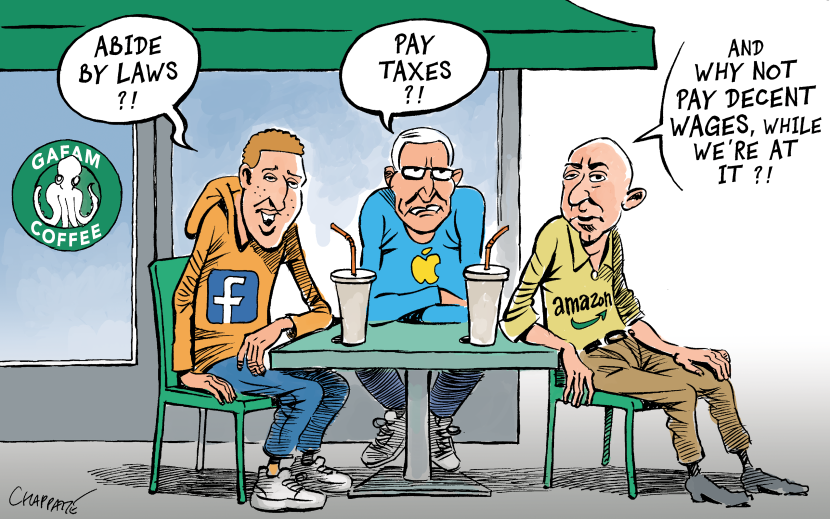
Subscribers Only Content
High resolution image downloads are available to subscribers only.
Not a subscriber? Try one of the following options:
OUR SERVICES PAY-PER-USE LICENSINGFREE TRIAL
Get A Free 30 Day Trial.
No Obligation. No Automatic Rebilling. No Risk.
When it comes to how he feels about big tech, Jeff Bartos didn’t mince his words.
“From shadow-banning conservatives, censoring content online, biased fact-checking, and now funneling millions of dollars into our elections it’s become clearer than ever: Big Tech must be reined in,” Bartos, a Republican candidate for U.S. Senate from Pennsylvania, wrote on Twitter on July 1.
But even as the suburban Philadelphia businessman parroted a popular Republican talking point, he and his wife also were enjoying the financial benefits that come with investing in such big tech titans as Alphabet Inc., which owns Google, and Apple.
Financial disclosure forms that Bartos filed with the U.S. Senate as a requirement for his bid for the GOP nomination in 2022, show that he and his wife jointly and individually hold hundreds of thousands of dollars in stock in the Silicon Valley giants.
Bartos isn’t alone. Disclosure forms filed by Val Arkoosh, who’s Bartos’ neighbor in heavily Democratic Montgomery County, who’s also running, similarly show individual and joint investments in Amazon, Alphabet, and Microsoft that run to the hundreds of thousands of dollars.
Arkoosh also serves on Montgomery County’s Board of Commissioners.
As they head into the thick of one of the most closely watched U.S. Senate contests in the country, the filings underline the tightrope that the hopefuls walk as they talk tough on the outsized influence of big tech, but also see their wealth enlarged by their sizable investments.
Both are part of a large field of Republican and Democratic candidates vying to replace Republican Sen. Pat Toomey, who is retiring in 2022.
In a wide-ranging interview, Bartos kept up his drumbeat of criticism, even as he defended his investments.
“If anything, it proves I’m not afraid to state my convictions, even if it’s against my financial interests,” he said. “I can advocate for policies that I think are right. As a shareholder, who owns stock, I believe that the company needs to change for the better.” He added that it’s the “responsibility,” and the “duty” of shareholders to lodge such criticisms.
Bartos, who accused social media sites such as Twitter and Facebook of “behaving like Democratic super PACs” for what he believes are unreasonable restraints on speech by conservatives, says he’d support “looking at anti-trust action if these companies don’t take a hard look at what they’re doing and change” their policies.
It’s a familiar grievance. Republican state lawmakers across the country, including Pennsylvania, began pushing legislation that would punish social media companies for policing content on their websites, the Associated Press reported.
The efforts began surfacing not long after former President Donald Trump was banished from Twitter and Facebook for spreading baseless claims of election fraud on the platforms.
Arkoosh, whose campaign declined an interview request, said through a spokesperson that she “believes members of Congress owning or trading stocks is a conflict of interest.”
Arkoosh “supports legislation to bar members of Congress from owning and trading stocks, and if elected, would put her eligible assets into a blind trust.” the spokesperson, Rachel Petri, said in an emailed statement.
And while they’re on opposite sides of the aisle, Arkoosh’s and Bartos’ respective criticisms of Big Tech mirror national trends that have Republicans and Democrats uniting on an issue at a time where bipartisan agreement on most issues is elusive at best and impossible at worst.
In June, for instance, a bipartisan cadre of lawmakers on Capitol Hill rolled out a package of antitrust bills. That spirit of bipartisanship has not prevented the issue from being politicized in Pennsylvania or elsewhere.
In a statement, Brad Bainum, a spokesman for the progressive super PAC American Bridge, said it was “classic politician behavior for ‘anti-Big Tech’ Jeff Bartos to own hundreds of thousands in tech company stocks.
“If he somehow manages to get out of this messy GOP primary, it’s clear Bartos can’t be trusted to represent Pennsylvania families in Washington,” Bainum said.
But with most Americans harboring the same skepticism, even as they, too, pad their retirement portfolios with Big Tech stocks, one veteran observer said he doubts the average voter will share in that outrage.
“Even though you own stock in Alphabet, you can still say Google should be reined in because it’s anti-competitive,” Republican consultant Christopher Nicholas said. “Or there’s Amazon, which is on both sides of the equation. [Political journalists] will notice, but Mr. and Mrs. Pennsylvania will not be overly concerned about it.”
That appears to be what Bartos is banking on as he heads into a competitive campaign season.
“The reality is that as [voters] parse through stuff, [they will] understand it through the lens of common sense,” he said.
–
Copyright 2021 John L. Micek, distributed exclusively by Cagle Cartoons newspaper syndicate.
An award-winning political journalist, John L. Micek is Editor-in-Chief of The Pennsylvania Capital-Star in Harrisburg, Pa. Email him at [email protected] and follow him on Twitter @ByJohnLMicek.